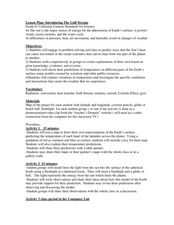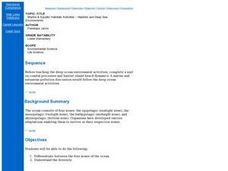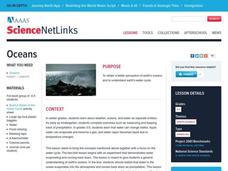Curated OER
Salinity
Students take a provided ocean Trivia Quiz in order to start a discussion of the ocean. They then perform an experiment on how the amount of salt in the ocean affects it and varies from ocean to ocean.
Curated OER
Climate Change Challenge
Students participate in a demonstration in which they role-play polar bears and habitat components to demonstrate the impacts of climate change on the Arctic Ocean ecosystem.
Curated OER
Nature Superfish
Students examine the billfish as a predator in the ocean. In this ocean, creatures, and tides lesson, students view video clips and discuss the sea creatures and scientists in the videos. Students create their own videos. students...
Curated OER
Thermal Expansion
Students examine how thermal expansion of water can affect sea level. They conduct an experiment that demonstrates what happens to water levels when exposed to heat, record the results on a data sheet, and discuss the results.
Curated OER
Earth Energy Budget Pre Lab
Learners explore energy by conducting an in class experiment. In this climate change lesson, students conduct a water vapor experiment in a soda bottle. Learners utilize graphs and charts to analyze the results of the experiment and help...
Curated OER
Whale Blubber
Students examine the purpose and characteristics of whale blubber. They work together to complete an experiment to test the fat as an insulator. They discover how humans use materials to protect them from the cold.
California Academy of Science
The Heat is On: Cause and Effect and Climate
The higher the number of letters in the final word for the National Spelling Bee, the higher the number of people killed by venomous spiders. Obviously, those two facts correlate, but no causation exists. Scholars view data based on...
Curated OER
Hatching Brine Shrimp
Learners experiment with temperature and salinity to detect favorable environments for hatching brine shrimp eggs. They make some predictions about which environments will yield the most hatched brine shrimp and record the number of...
Curated OER
Water Currents
Students demonstrate how ocean currents are influenced by changes in density. They discover that temperature and salintiy affect density as well. They participate in a short experiment to end the lesson.
Curated OER
Introducing The Gulf Stream
Sixth graders research the average temperatures of different places on Earth. In this earth science lesson, 6th graders explain how the sun's heat cause ocean movement. They discuss how temperature change affects the weather we experience.
Curated OER
Salinity
Learners define and discuss salinity, conduct classroom experiment to determine salinity of water sample by using hydrometer, record predictions, and demonstrate understanding of how salinity influences object's ability to float in water.
Curated OER
Locating Vent Fields Using CTD Data
Students describe the way hydrothermal vents work. Students work on locating vent regions through remote collection of data about water temperature and density. Comparing density and temperatures graphs, students search for indicators...
Curated OER
Investigating Convection Currents
Students examine how differences in the temperature and salinity of the water help create ocean currents. They perform an experiment which shows how temperature affects the circulation of ocean water.
Curated OER
Habitats and Deep Sea Environments
Students examine and identify the characteristics of the four zones of the ocean. They discover the amount of diversity in marine habitats. They also explore the adaptations organisms have that have allowed them to survive.
Curated OER
Sea Floor Spreading I
Students use Excel to explore the geodynamics Model equation for ocean depth around a sea-floor spreading center. They complete an introductory tutorial on Excel for students with no prior Excel experience.
Curated OER
Three Methods of Heat Transfer
Learners participate in a variety of experiments designed to illustrate types of heat transfer including conduction, convection and radiation. They complete worksheets as an assessment of the experiments.
Curated OER
Rising Air
Young scholars investigate the concept of rising air in the formation of clouds and precipitation. In this rising air lesson, students conduct an experiment with hot and cold water that shows how warm water rises due to thermal buoyancy....
Curated OER
Hypothermia on the High Seas
Students identify and present the effects on humans when the body temperature falls, demonstrate and explain how the body loses heat, and understand hypothermia and cold water survival techniques.
Curated OER
Oceans
Students use their prior knowledge to being their examination of the water cycle. In groups, they complete an experiment in which they can see water evaporating and coming back to the ground. They discover the ocean's water evaporates...
Curated OER
What Factors Impact a Greenhouse?
Students analyze the Greenhouse Effect and the science of greenhouses. In this global climate lesson, students read background information about the 'greenhouse effect' and define 'albedo.' Students examine pictures of clouds, read about...
Curated OER
Air Pressure and Wind
Fifth graders study air pressure and learn how it can change the weather. In this air pressure lesson, 5th graders study the given diagrams and complete the experiments to learn how air pressure can change the weather. Students read...
Curated OER
Saltwater Science
Students conduct an experiment that shows them how salt water allows things to float. In this salt water lesson plan, students mix ingredients together to create salt water and observe how it makes the oceans dense. They then interpret...
Curated OER
Density Currents
Students study how fluids of differing densities interact with one another, how densities of fluids can be changed, and how density currents transport and deposit tremendous amounts of sediment in lakes and in the ocean.
Curated OER
Current Interactions
Students design an experiment to see how wind, temperature, and salinity work together to influence ocean currents and present it in a report format. They explain to their classmates how experiment findings relate to ocean currents.

























